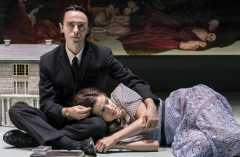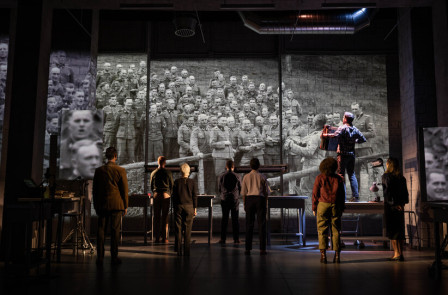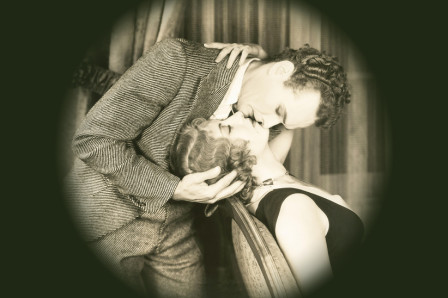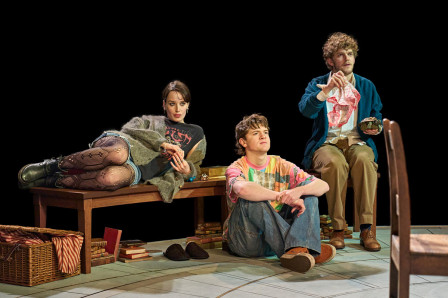Review: ARISTOCRATS at the Donmar Warehouse
 Brian Friel’s ARISTOCRATS at the Donmar Warehouse — it’s Bergman under the influence of Chekhov, set on the imaginary croquet lawn of a once grand house in Ballybeg, Ireland.
Brian Friel’s ARISTOCRATS at the Donmar Warehouse — it’s Bergman under the influence of Chekhov, set on the imaginary croquet lawn of a once grand house in Ballybeg, Ireland.
The O’Donnelly clan — the aristocratic Catholic family of the title whose patriarchs down the generations have clung to their landowning influence through practising law and sitting in judgement of the district’s cap-d’offing peasants, is in decline. The off-spring of the now bedridden former Judge and master of the house, are reliving their idyllically remembered childhoods prior to the wedding of the youngest sister to a much older man. But the joyous veneer is a thin one and each unconsciously reveals how they have suffered as a result of their father’s dominance and practical, functional cruelty. The catalyst for these quietly unearthed revelations, is a guest - Tom, an American researcher who is documenting the influence of such families on their local districts.
Three sisters - the eldest of which nurses and cares for their father, is little more than a servant and prisoner in the rapidly disintegrating family pile. Another is beautiful, but feels her uselessness and lack of talents, so has found solace in alcohol. The youngest is playful yet vulnerable and in one unexpectedly harsh moment, corrects an unjustified compliment of her good-but-never-accomplished piano playing (a view we are left in no doubt, was her father’s). Yet another black sheep sends a message from Africa where she is a nun at a Catholic mission - she too becomes cold and sarcastic when addressing her father through the tape recording. We learn that their mother was insensitively treated and probably committed suicide. Thus the bedrock of female subjugation is layered meticulously as the solid foundation for the play.
Binding the young women together is a love for their ludicrously upbeat, yet jittery and unmistakably fragile brother Casimir who is visiting from his home in Hamburg. He is fey and probably homosexual, (despite the much referenced existence of “Helga and the boys”), which adds significant poignancy as he jauntily recounts a conversation in which his father once pointed down the hill and assured him that he was fortunate not to be born down there where he would have become the village idiot; at the Hall at least, he could safely be ‘absorbed’.
Stylistically, Aristocrats mirrors the tradition of familial talking-shop plays, where little action takes place but the underlying tensions and revelations cause the air to prickle. Friel’s gift is to underplay these moments so that the light and airy politesse disguises the deep trauma and sadness inherent in his characters.
Lyndsey Turner once again directs her actors with a deftness and sensitivity which has enabled them to imbue every ounce of lightness and pathos into the stilted scenario. David Dawson as Casimir and Elaine Cassidy as his beautiful but disenchanted alcoholic sister, give stand-out performances on a stage populated with finely realised characterisations.
For once, Es Devlin has slightly disappointed with her simple, stylised set and doll’s house reference piece. The Donmar always presents certain challenges for set designers with its awkward sight lines, but we have come to expect greater inventiveness from Devlin’s undoubted brilliance, so this effort felt a tad underwhelming.
Aristocrats is definitely a play for empaths and anyone who remembers enduring harsh parental criticism which was delivered...”for your own good”.
Latest News

 HERE THERE ARE BLUEBERRIES at Stratford East - First look images released
5 February 2026 at 15:35
HERE THERE ARE BLUEBERRIES at Stratford East - First look images released
5 February 2026 at 15:35

 UK premiere of STAGE KISS heading to London
5 February 2026 at 15:16
UK premiere of STAGE KISS heading to London
5 February 2026 at 15:16

 Review: ARCADIA at Old Vic
5 February 2026 at 11:33
Review: ARCADIA at Old Vic
5 February 2026 at 11:33

 Alex Kingston and Richard Schiff star in Michael Frayn's COPENHAGEN
5 February 2026 at 10:45
Alex Kingston and Richard Schiff star in Michael Frayn's COPENHAGEN
5 February 2026 at 10:45